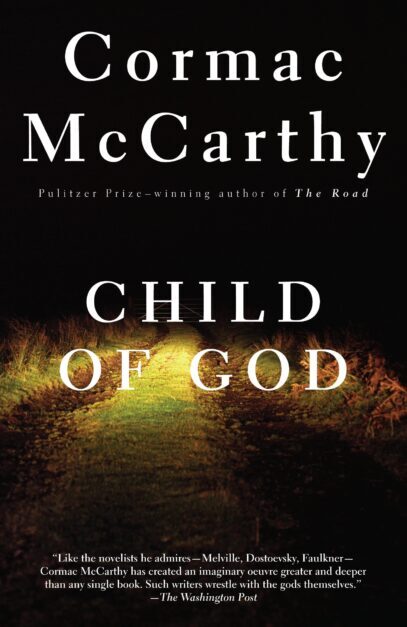 By CORMAC McCARTHY (Vintage; 1973/93)
By CORMAC McCARTHY (Vintage; 1973/93)
The adoption of Cormac McCarthy by the literati, the very crowd who tout the works of Anne Tyler and Alison Lurie while turning their backs on the more unsparing likes of Hubert Selby Jr. and Harry Crews, remains a mystery to me. Cormac McCarthy’s writing, after all, is very much akin to that of Selby and Crews in its unflinching depictions of grit, gore and overall depravity. No other McCarthy novel better exemplifies those tendencies than CHILD OF GOD.
In these pages we’re introduced to Lester Ballard, a mentally deficient man living in the wilds of East Tennessee. Following a stint in jail Ballard comes to indulge in random murder, cross dressing and necrophilia, which he practices in an underground cave where he carefully lays out his deceased sex partners “like saints.” Ballard is shunned by the community in which he resides and made the subject of all sorts of malicious gossip, yet he isn’t entirely out of place in this backwoods environ, where babies bite the legs off birds and fathers manhandle their daughters in broad daylight.
It’s all described in McCarthy’s trademarked ultra-spare yet rhapsodic manner. Special attention is paid to the profane and often racist dialogue spoken by Ballard and his fellows, which feels authentic to the region and has a gritty poetry all its own. The dialogue is also rendered, in another McCarthy trademark, without quotation marks, a tendency I’ve frankly never understood (and nor am I alone in that opinion—from James Ellroy: “I tried to read a Cormac McCarthy book and thought, why doesn’t this cocksucker use quotation marks?”).
Lester Ballard is a prototypical McCarthy psychopath (alongside BLOOD MERIDIAN’S Judge Holden and NO COUNTRY FOR OLD MEN’S Anton Chigurh). His story is not, as an Amazon.com reviewer mistakenly claims, “the most sympathetic portrayal of necrophilia in all of literature” (that, in my view, would be Gabriel Wittkop’s THE NECROPHILIAC), but there’s no question that as rendered in these pages Lester Ballard is a curiously sympathetic and even heroic figure in the way he manages to find contentment (of a sort) in a thoroughly inhospitable landscape.
The cast also includes a virtuous sheriff—another McCarthy trademark—who finds himself flummoxed by the depths of evil and depravity confronting him, and quite a few assorted hicks and rednecks. Then there are the landscapes, from the flooded lowlands where Ballard initially resides to the dank cave where he eventually sets up camp, which as described in McCarthy’s dense, Faulklerian prose assume the status of characters in their own right.
